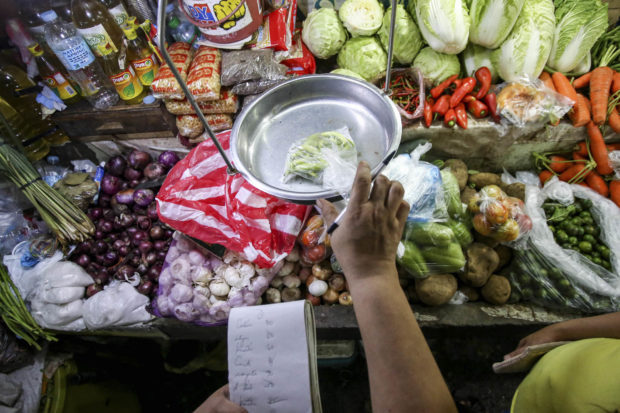MANILA, Philippines—The central bank expects prices of basic goods and services in the country to accelerate at a slightly faster pace in July after declining in June as the rising cost of fuel made itself felt across the economy.
In a mobile phone message to reporters, Bangko Sentral ng Pilipinas (BSP) Governor Benjamin Diokno said the agency’s economists expect the inflation rate for the seventh month of the year to rise between 3.9-4.7 percent, with a “point projection” at 4.3 percent.
“Higher prices of domestic petroleum products and key food items along with the upward adjustment in Meralco electricity rates and a weaker peso are the main sources of upward price pressures for the month,” he said.
The inflation rate for June came in at 4.1 percent, declining from the 4.5 percent recorded in May. The Philippine Statistics Authority is scheduled to release the consumer price index for July on Aug. 5., Thursday.
ING Bank Manila senior economist Nicholas Mapa noted that meat prices remain “stubbornly high” and select food items are set to become pricier due to the Department of Trade and Industry’s adjustment of suggested retail prices.
As a result, food items will likely tip the inflation path upwards in the coming months.
“We now expect inflation to breach the upper end of the BSP target [of 2-4 percent for the full year] as the peso remains weak and persistent food inflation keeps price pressures elevated,” he said.
Mapa said he believes the central bank will not recalibrate its interest rates in the near term with Diokno likely to look past the cost push driven acceleration.
Hiking policy rates at a time when gross domestic product growth is expected to fall below the official target of 6-7 percent will likely derail the fragile growth prospects for the country, he warned.
Further, policy tightening will have a limited to no impact on counteracting the rise in global crude oil or the cost of canned goods, thereby rendering recalibration of rates useless at this point, if not to slow growth and exact even more hardship for country.
“In the coming months we expect inflation to remain elevated given a weaker currency, elevated energy costs and pricey food items with the BSP’s 4 percent forecast clearly under threat,” he said. “BSP however will likely look past the breach given its supply side nature while providing the economy as much support as it can muster amidst the current protracted economic downturn.”
For his part, Diokno said the BSP will continue to monitor emerging price developments to ensure that its primary mandates of price stability conducive to balanced and sustainable economic growth is achieved.
TSB
